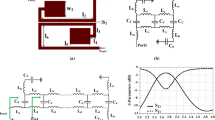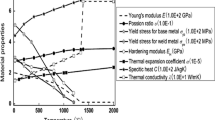Abstract
Stripline discontinuities are basic elements of many stripline circuits, such as the multilayer microwave monolithic ICs and the interconnect systems in high-speed digital circuits. Bend as one type of the stripline discontinuities will be modeled in this paper.
A multilayer perceptron neural network(MLPNN) is used to model the bend discontinuities in stripline circuits. The MLPNN is electromagnetically developed with a set of training data that are produced by the full-wave finite-difference time-domain (FDTD) method. The full-factor design of experiments is used to determine the size of the training data.
Similar content being viewed by others
REFERENCES
P. Waston and K. C. Gupta, “EM-ANN models for microstrip vias and interconnects in dataset circuits,” IEEE Trans. Microwave Theory Tech., vol.44,no.12, pp.2495–2503, Dec.1996.
A. Veluswami, M. S. Nakhla, and Q. J. Zhang, “The application of neural networks to EM-based simulation and optimization of interconnects in high-speed VLSI circuits,” IEEE Trans. Microwave Theory Tech., vol.45, no.5,pp.712–723, May 1997.
G. L. Creech, et al., “Artificial neural networks for Fast and accurate EM-CAD of microwave circuits,” IEEE Trans. Microwave Theory Tech., vol. 45, no.5, pp.794–802, May 1997.
T. Horng, C. Wang, and N.G. Alexopoulous, “Microstrip circuit design using neural networks,“ in MTT-S Int. Microwave Symp.Dig., 1993,pp.413–416.
I. Ratner, H. Ali, E.M. Petriu, “Neural Network Simulation of a Dielectric Ring Resonator antenna,” Journal of Systems Architecture, vol,44,pp.569–581, 1998.
X. Zhang and K.K. Mei, “Time-Domain Finite Difference Approach to the Calculation of the Frequency-Dependent Characteristics of Microstrip Discontinuities,” IEEE Trans. Microwave Theory Tech., vol. 36, no. 12,pp.1775–1788,December 1988.
S. Haykin, Neural Networks, A Comprensive Foundation, New York: Macmillan, 1993.
H. Demuth, M. Beale, Neural Network Toolbox for Use with Matlab, User's Guide, The Mathworks, Inc., Natick, MA, 1994.
S. R. Schmidt and R. G. Launsby, Understanding Industrial Designed Experiments, Colorado Springs, CO: Air Academy Press, 1992, pp.3.1–3.50.
Author information
Authors and Affiliations
Rights and permissions
About this article
Cite this article
Hong, J., Wang, BZ. Artificial Neural Network Models for the Bend Discontinuities in Stripline Circuits. International Journal of Infrared and Millimeter Waves 20, 1563–1579 (1999). https://doi.org/10.1023/A:1021773006977
Issue Date:
DOI: https://doi.org/10.1023/A:1021773006977




